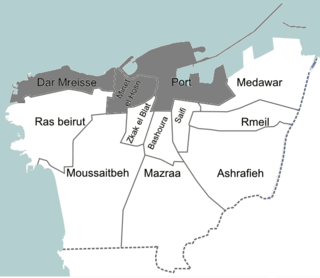Related Research Articles

Armenian Secret Army for the Liberation of Armenia (ASALA) was a militant organization active between 1975 and the 1990s whose stated goal was "to compel the Turkish Government to acknowledge publicly its responsibility for the Armenian genocide in 1915, pay reparations, and cede territory for an Armenian homeland." ASALA itself and other sources described it as a guerilla and armed organization. Some sources, including the United States Department of State, as well as the Ministry of Foreign Affairs of Azerbaijan listed it as a terrorist organization.

Haigazian University is a higher education institution founded in 1955 in Beirut, Lebanon as Haigazian College. For a brief period starting 1992, the name was changed to Haigazian University College before the institution adopted the present name in 1996. It offers programs leading to Bachelor's degrees in the Arts and Sciences as well as Business Administration and Economics, in addition to Master's degrees in the Arts, Sciences and Business Administration. English is the main language of instruction, although some courses are offered in Armenian and Arabic. All degrees from Haigazian are recognized by the Lebanese government and the Association of International Colleges and Universities. It is supported by the Armenian Evangelical community, and was established primarily to meet the needs of the large Lebanese-Armenian population. However, the university is open to all students, regardless of race, nationality, or creed, and has professors and student body from all sections of Lebanese society.

The Armenian Evangelical Central High School is one of the oldest and most-well established Armenian schools in Lebanon. It was founded in 1922 in a refugee camp, on the initiative of the Reverend Yenovk Hadidian. Ten years later, it moved to its present location in Ashrafieh, eastern Beirut.
The Armenian Evangelical Secondary School of Anjar was founded by Swiss Missionaries in 1947. It has a dormitory for boys and girls.

Armenians have lived in Lebanon for centuries. According to Minority Rights Group International, there are 156,000 Armenians in Lebanon, around 4% of the population. Prior to the Lebanese Civil War, the number was higher, but the community lost a portion of its population to emigration.
Confessionalism is a system of government that is a de jure mix of religion and politics. It typically entails distributing political and institutional power proportionally among confessional communities.

Daniel Varoujan was an Armenian poet of the early 20th century. At the age of 31, when he was reaching international stature, he was deported and murdered by the Young Turk government, as part of the officially planned and executed Armenian genocide.
Rev. James Karnusian was a Swiss-Armenian protestant pastor, writer and public activist.

The Armenian Revolutionary Federation, also known simply as Tashnag, is an Armenian political party active in Lebanon since the 1920s as an official political party in the country after having started with small student cells in the late 1890s and early 20th century.
Leila Badre is a Lebanese archaeologist and director of the Archaeological Museum of the American University of Beirut.

Beirut III was an electoral district in Lebanon. It covered six neighbourhoods (quartiers) in the western parts of the capital; Dar El Mreisse, Mazraa, Minet El Hosn, Moussaitbeh, Ras Beirut and Zuqaq al-Blat. The constituency elected ten members of the Parliament of Lebanon; five Sunni Muslim, one Shia Muslim, one Druze, one Protestant, one Greek Orthodox and one Minorities. The constituency was created with the 2008 Doha Agreement, ahead of the 2009 parliamentary election.
Marwan Charbel is a retired Lebanese brigadier general and the former minister of interior and municipalities between 2011 and 2013.
Manoug Manougian was an Armenian scientist, professor, and considered the father of the Lebanese space program. Manougian was born on April 29, 1935, in Jerusalem. He died on March 27, 2024, in Tampa, Florida. He came to the United States in 1956. His parents are Nishan and Sirpouhi Manougian.

In Lebanese politics, Minorities is a term that includes six different Christian sects; Syriac Orthodox, Syriac Catholics, Assyrian Church of the East, Chaldean Catholics, Latin Catholics and Coptic Orthodox. 1 of the 128 seats in the national parliament is allocated to Minorities. The Minorities' seat is elected from Beirut III electoral district, an electoral district with a large Sunni Muslim majority.
On May 6, 1975, a massive gathering took place in the Lebanese capital Beirut, to commemorate the 60th anniversary of the Armenian genocide. Some 100,000 people participated in the march, which was organized jointly by different groups across the Armenian political spectrum.

Beirut V – Minet El Hosn was an electoral district in Lebanon, used in the 1953 parliamentary election. The electoral district covered three neighbourhoods of Beirut and elected a Minorities parliamentarian. Joseph Chader of the Kataeb Party was elected from the district in 1953.
Artin Madoyan was a Lebanese-Armenian communist politician. He was the most prominent Armenian leader of the Lebanese Communist Party. He was seen as the 'right hand' of Syrian communist leader Khalid Bakdash.

Aram Karamanoukian was a Syrian-Armenian Lieutenant General of the Syrian Army. He was also a member of the Syrian Parliament. He is the author of several books. For his work as a scholar and military serviceman, Karamanoukian received medals from Egypt, Armenia, Lebanon, Syria, and France.

Beirut I is an electoral district in Lebanon. The district elects eight members of the Lebanese National Assembly – three Armenian Orthodox, one Armenian Catholic, one Greek Catholic, one Greek Orthodox, one Maronite and one Minorities.
References
- 1 2 Sfeir, Myriam (2003). "Arda Arsenian Ekmekji: An Armenian-Lebanese Academician Recounts". Al-Raida Journal: 71–73. doi: 10.32380/alrj.v0i0.429 . ISSN 0259-9953. Archived from the original on November 22, 2018. Retrieved 2018-11-22.
- ↑ "Haigazian Academics". Archived from the original on 2018-10-24. Retrieved 2018-11-22.
- ↑ "Decisions, Divisions, and Discontent: Reforming Lebanon's Electoral Procedures". Chicago Policy Review. 2012-11-09. Retrieved 2024-03-01.
- ↑ Mirror-Spectator, The Armenian (2012-08-06). "Dr. Arda Ekmekji Travels to West Coast For US Launch of Towards Golgotha". The Armenian Mirror-Spectator. Retrieved 2024-03-01.